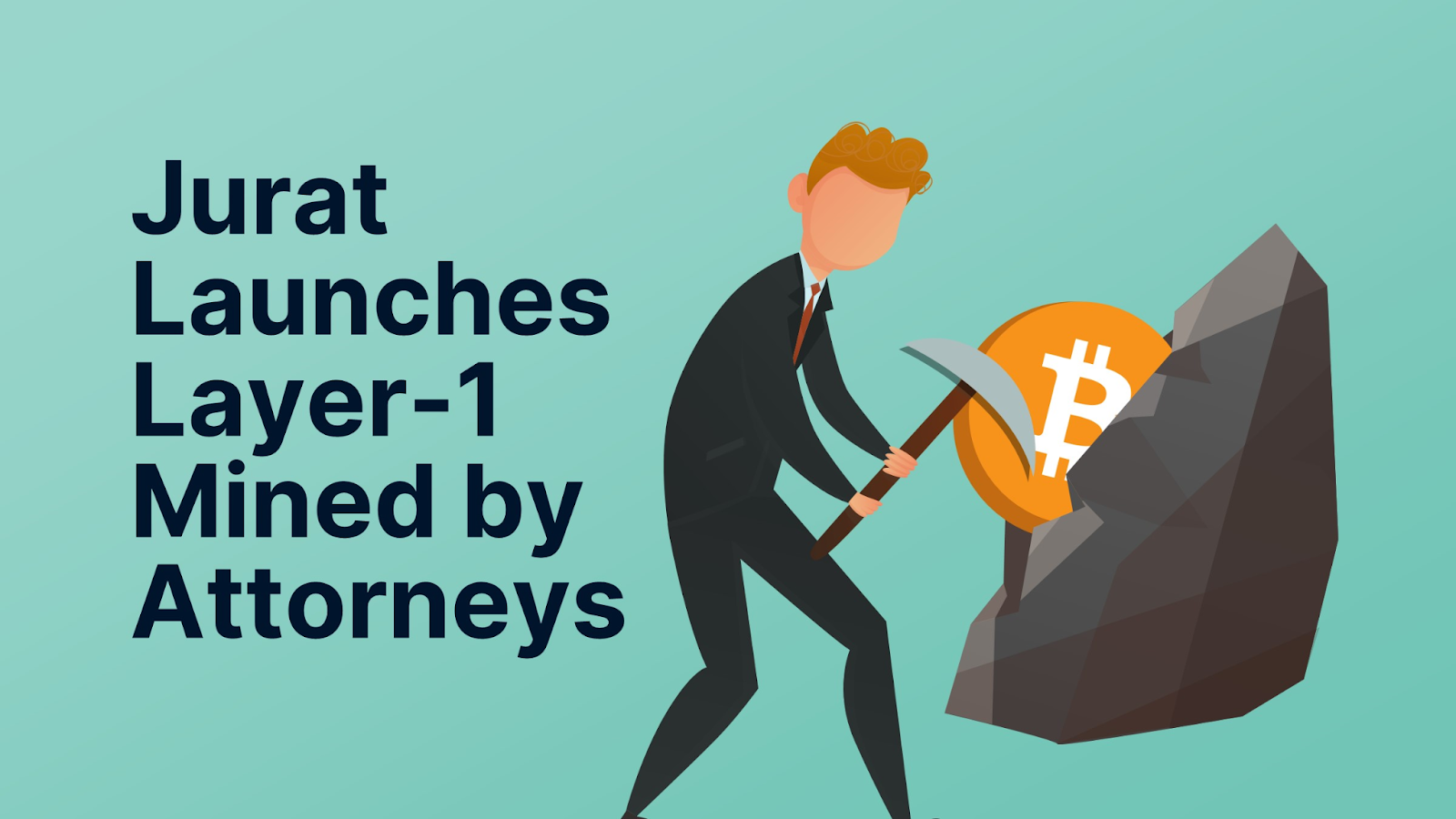
PRESS RELEASE. A group of attorneys and blockchain engineers are building a new Bitcoin fork blockchain using an emerging legal enforcement protocol that bridges the blockchain to state and federal courts. Called Jurat, the protocol enables capabilities like freezing disputed coins or recovering stolen coins after a hack, all under the auspices of the justice system. The native coin of the new fork is called $JTC.
The primary objectives for the new blockchain are to ensure robust consumer protection for cryptocurrency users and provide on-chain enforcement for legal rights afforded in commercial transactions, property transfers, and the banking system.
The $JTC token is due to be listed on exchanges in the near future. At this time, $JTC mining is open for licensed attorneys in all jurisdictions and may be made available to legacy Bitcoin miners in the future.
Attorneys Line Up To Participate
To start the process for becoming a $JTC miner, attorneys should complete the mining information request form, available on Jurat’s website.
$JTC miners receive $JTC tokens as compensation for supporting the network and helping court rulings to execute on-chain. Mining with Jurat also offers attorneys the chance to become better acquainted with the technology underlying blockchain transactions and participate in a more legally compliant Web3.
Mining by Non-Attorneys
Mining applications for Jurat are currently open to licensed attorneys only. Jurat may expand to include legacy Bitcoin miners in the future.
How to obtain $JTC
$JTC forked at Bitcoin block height 717808, which occurred on January 8, 2022. All addresses that contained $BTC as of that block received $JTC at a 1:1 ratio to their $BTC and can claim the coins using the Jurat Wallet, which is available for Android (Play Store), IOS (App Store), Windows (Jurat.io), and Mac (Mac App Store).
Currently, $JTC cannot be bought on exchanges but will be listed soon. l
Why Does Blockchain Need Jurat?
Jurat was founded by Mike Kanovitz, a partner at Loevy & Loevy in Chicago, USA, who works in Web3 and traditional civil litigation. He conceived of Jurat as a means to provide consumer protection in the crypto space after seeing many clients victimized by fraud and theft.
“Witnessing people lose their hard-earned savings to hackers and phishing scams only to be left with no legal recourse inspired me to create Jurat. “said Mike Kanovitz, Jurat CEO and co-founder.
After creating the protocol and proving that legal rights could be enforced on-chain without sacrificing the benefits of decentralization, Kanovitz recognized that the technology could help make blockchains safer and more usable for mainstream commercial transactions.
“Blockchain technology has the potential to benefit consumers and businesses in countless ways, but the absence of an effective layer for enforcing legal rights prevents it from achieving mainstream adoption,” he said.
The $JTC Bitcoin fork uses Jurat to offer the unique ability to recover digital assets and freeze accounts associated with illicit activities. The protocol can provide legal recourse for users without involving intermediaries or asset custodians while maintaining the full decentralization of the network. There are four steps to the process:
- A $JTC user who needs legal recourse because of on-chain crime, a mistaken transaction, or lost private keys can create a Jurat request ID through the Jurat UI. The Jurat ID is a string of characters that specifies the transaction that the claimant wants the court to order. For example, a transaction to send coins from a scammer’s wallet back to the true owner. Armed with the ID, the user can bring the matter to court.
- After filing a case, the user provides the ID to the court. If the judge agrees with the lawsuit, they signify this to Jurat blockchain nodes by including the ID in their written opinion and placing it on the court’s public docket.
- Once on the public docket, specialized nodes can access the court’s opinion and recognize the Jurat ID. The code informs the nodes that the judge has ruled and what transaction the judge has ordered.
- Each miner then verifies the court order, like verifying a private key signature. The process is automatic and does not require any intermediaries.
$JTC has already been used live in court. Recently, a US federal judge considered the cryptocurrency accounts of several sanctioned individuals, including a wallet belonging to North Korean state-sponsored hackers called the Lazarus Group. The court ordered the hackers’ accounts frozen, and the Jurat nodes executed the court orders automatically and seamlessly, preventing the hackers from spending the $JTC in the sanctioned accounts.
Jurat miners are rewarded for maintaining the blockchain with $JTC rewards.
Building Legal3 With Jurat
The success of Jurat technology in the case brought against the Lazarus group, and others is an early step in Jurat’s broader goal of introducing a legal base layer for every transaction in Web3.
Jurat will continue to add new attorneys to its mining operation as the $JTC launch date draws closer and encourages all attorneys who have a passion for justice on the blockchain to apply.
Join the Jurat communities on Telegram & Discord to keep updated with the latest Jurat news.
This is a press release. Readers should do their own due diligence before taking any actions related to the promoted company or any of its affiliates or services. Bitcoin.com is not responsible, directly or indirectly, for any damage or loss caused or alleged to be caused by or in connection with the use of or reliance on any content, goods or services mentioned in the press release.
from Bitcoin News https://ift.tt/jC5SzBc

Comments
Post a Comment